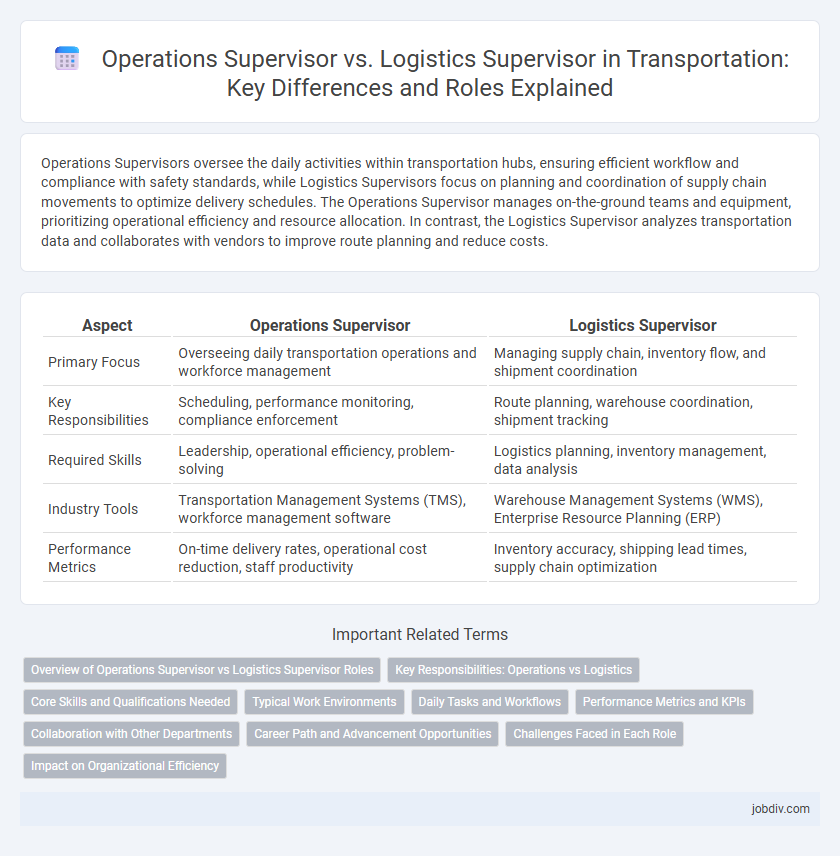Operations Supervisors oversee the daily activities within transportation hubs, ensuring efficient workflow and compliance with safety standards, while Logistics Supervisors focus on planning and coordination of supply chain movements to optimize delivery schedules. The Operations Supervisor manages on-the-ground teams and equipment, prioritizing operational efficiency and resource allocation. In contrast, the Logistics Supervisor analyzes transportation data and collaborates with vendors to improve route planning and reduce costs.
Table of Comparison
| Aspect | Operations Supervisor | Logistics Supervisor |
|---|---|---|
| Primary Focus | Overseeing daily transportation operations and workforce management | Managing supply chain, inventory flow, and shipment coordination |
| Key Responsibilities | Scheduling, performance monitoring, compliance enforcement | Route planning, warehouse coordination, shipment tracking |
| Required Skills | Leadership, operational efficiency, problem-solving | Logistics planning, inventory management, data analysis |
| Industry Tools | Transportation Management Systems (TMS), workforce management software | Warehouse Management Systems (WMS), Enterprise Resource Planning (ERP) |
| Performance Metrics | On-time delivery rates, operational cost reduction, staff productivity | Inventory accuracy, shipping lead times, supply chain optimization |
Overview of Operations Supervisor vs Logistics Supervisor Roles
Operations Supervisors manage day-to-day activities ensuring smooth workflow, resource allocation, and adherence to company policies in transportation settings. Logistics Supervisors specialize in coordinating the storage, distribution, and shipment of goods, optimizing supply chain efficiency and delivery timelines. Both roles require leadership skills but differ in focus: Operations Supervisors oversee overall operational processes, while Logistics Supervisors concentrate on the movement and management of inventory and freight.
Key Responsibilities: Operations vs Logistics
Operations Supervisors oversee day-to-day activities, ensuring efficient workflow, workforce coordination, and adherence to safety and quality standards in transportation hubs. Logistics Supervisors focus on managing supply chain processes, including inventory control, shipment tracking, and coordination between carriers and warehouses to optimize delivery schedules. Both roles require strategic planning and real-time problem-solving to maintain operational continuity and meet service level agreements.
Core Skills and Qualifications Needed
Operations Supervisors in transportation require strong leadership, problem-solving, and process management skills to oversee daily activities and ensure efficient workflow. Logistics Supervisors need expertise in supply chain coordination, inventory management, and transportation planning to optimize goods movement and distribution. Both roles demand proficiency in communication, data analysis, and familiarity with industry regulations for effective supervision and operational success.
Typical Work Environments
Operations Supervisors typically work in manufacturing plants, warehouses, and distribution centers where they oversee daily activities to ensure efficient production and shipping processes. Logistics Supervisors are often found in transportation hubs, freight companies, and supply chain offices, managing the coordination of shipments, inventory flow, and delivery schedules. Both roles require strong organizational skills but differ in their primary focus environments--operations centers versus logistical coordination facilities.
Daily Tasks and Workflows
Operations Supervisors oversee day-to-day transportation workflows, coordinating vehicle dispatch, driver schedules, and maintenance to ensure timely delivery. Logistics Supervisors focus on supply chain coordination, managing inventory levels, shipment tracking, and warehouse operations to streamline product movement. Both roles require real-time problem-solving and communication with staff to maintain efficiency and meet delivery deadlines.
Performance Metrics and KPIs
Operations Supervisors prioritize performance metrics such as on-time delivery rates, workflow efficiency, and resource utilization to ensure seamless transportation processes. Logistics Supervisors focus on KPIs like inventory accuracy, shipment tracking reliability, and cost-per-mile optimization to enhance supply chain coordination. Both roles rely heavily on data-driven insights to improve operational effectiveness and reduce transit delays.
Collaboration with Other Departments
Operations Supervisors coordinate closely with warehouse, inventory, and customer service teams to streamline daily shipment processes and resolve bottlenecks efficiently. Logistics Supervisors collaborate extensively with procurement, supply chain management, and distribution departments to optimize routing, freight costs, and delivery schedules. Both roles rely heavily on cross-departmental communication to ensure seamless transportation workflows and meet organizational delivery targets.
Career Path and Advancement Opportunities
Operations Supervisors typically advance by gaining expertise in process management and team leadership within transportation hubs, leading to roles like Operations Manager or Director of Operations. Logistics Supervisors often pursue specialization in supply chain coordination and inventory control, progressing to positions such as Logistics Manager or Supply Chain Director. Both paths offer opportunities for growth into senior management roles, with Logistics Supervisors frequently moving into strategic planning due to their focus on end-to-end supply chain efficiency.
Challenges Faced in Each Role
Operations Supervisors face challenges such as optimizing workforce efficiency, managing day-to-day activities, and ensuring compliance with safety regulations in transportation hubs. Logistics Supervisors encounter difficulties in coordinating supply chain workflows, managing inventory accuracy, and adapting to fluctuating shipment schedules. Both roles require strong problem-solving skills, but Operations Supervisors emphasize operational continuity while Logistics Supervisors prioritize seamless goods movement.
Impact on Organizational Efficiency
Operations Supervisors optimize workflow by managing day-to-day activities and coordinating teams, directly improving operational efficiency and reducing downtime. Logistics Supervisors focus on the seamless movement, storage, and distribution of goods, enhancing supply chain reliability and minimizing delivery delays. Both roles significantly impact organizational efficiency by ensuring smooth processes and resource utilization within transportation management.
Operations Supervisor vs Logistics Supervisor Infographic

 jobdiv.com
jobdiv.com